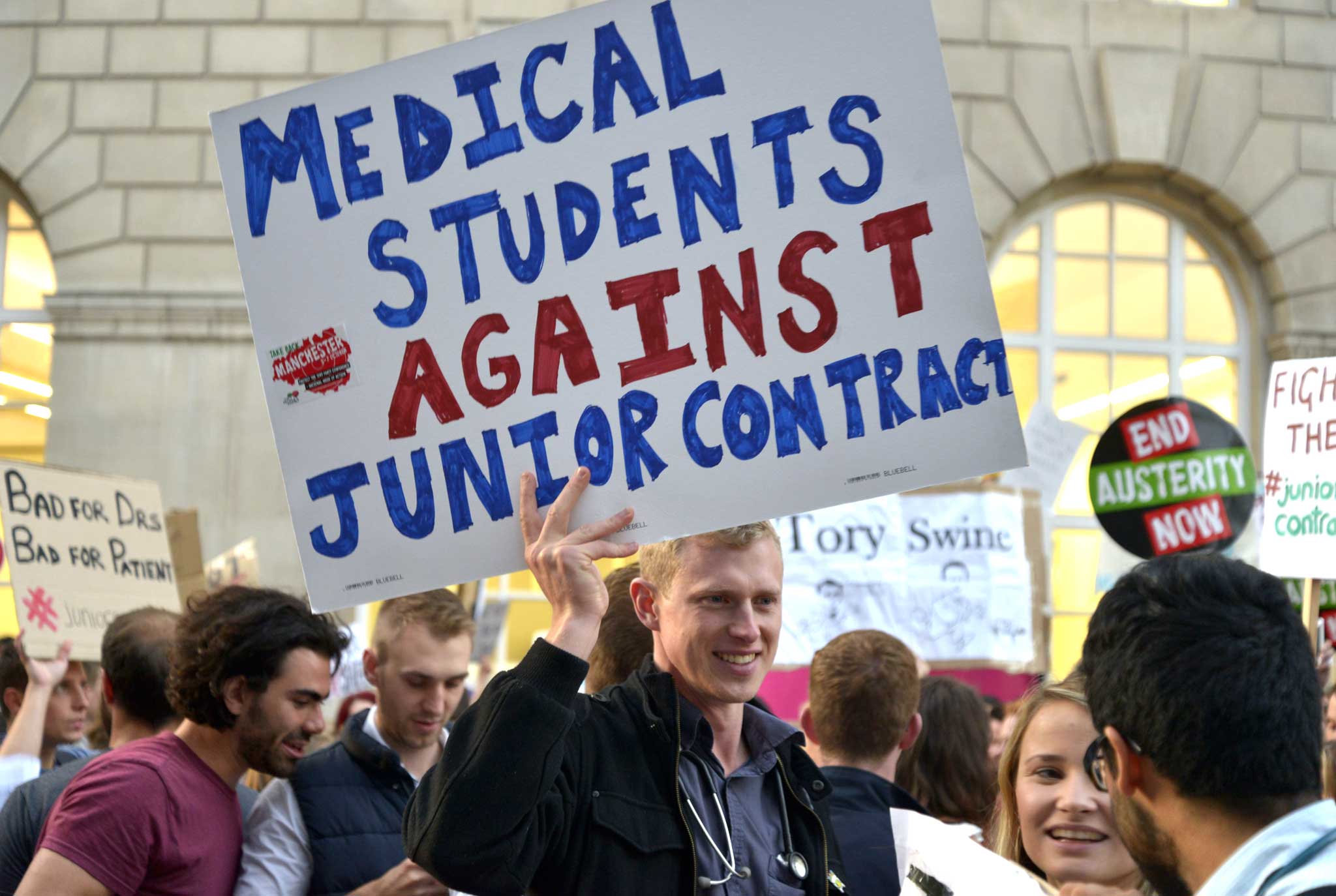The amount of junior doctors planning to go abroad has doubled in a year - but Hunt still plans to impose his contract
A confidential health service for doctors says half their patients are now under 30, when almost all used to be middle-aged

I am a junior doctor in obstetrics and gynaecology, so I have seen firsthand the problem with retention rates in medicine. Put simply, our doctors are leaving in their droves – or failing to arrive at all. In OGBYN, we currently face 20 per cent attrition rates – so 1 in 5 people are leaving during their training.
Rota gaps are commonplace, with doctors often being asked to work extra shifts or work with long-term gaps. Junior doctors routinely receive emails and texts asking them to work extra shifts in order to cover the service. This week I have received numerous emails and texts asking me to cover shifts in my hospital, and last week on annual leave I worked two extra night shifts to plug rota gaps despite the fact I had already worked seven days straight the week before.
Last year, I was on a registrar rota that should have had 14 registrars but we were seven down. At times, I was one of only two full-time registrars in the hospital. This meant that, in addition to already being stretched during the week, I worked extra shifts to cover the service. By the end of six months of the same, I was so exhausted and burnt-out that I considered either reducing my hours or giving up my profession.
Luckily I had a holiday planned where I slept, got some perspective and remembered my vocation – but this is my reality. And, according to Jeremy Hunt, it’s only going to get worse.
Clare Gerada heads up a confidential health service for doctors in London and says that almost 50 per cent of her new patients are under 30 years old (they used to be in their 40s and 50s and usually male, suffering from alcohol problems). Now the problems include depression, anxiety and symptoms akin to post traumatic stress disorder.
These doctors complain of working intolerable shifts seemingly designed by robots with no concept of human function – and they’re right. Written evidence form the Cass Business School suggests ambiguities of the NHS Employers’ new contract will result in increased disruption of doctors’ circadian rhythm, increasing their social isolation impacting their health and impacting severely on their overall mental wellbeing.
On social media, junior doctors have criticised the rotas published by NHS Employers “illustrative” of the new 7-day NHS for this exact reason. When we have requested face to face meetings with NHS Employers to discuss these working patterns and terms and conditions, we are dismissed and instead asked to speak to our “own employers” who will pass on our questions which NHS Employers will update their “online resource” to answer “most frequently answered questions”.
On February 11, 2016 Jeremy Hunt announced unilateral imposition of the junior contract while simultaneously commissioning an independent review of junior doctors’ experience of their NHS training and employment “…to better understand and deal with the longstanding issue of low morale”.
The irony of this was not lost on 54,000 junior doctors who have increasingly felt demoralised, devalued and dejected by the shambolic handling of this dispute. Crucially, the review led by the Academy of Medical Royal Colleges would have no remit to investigate how “pay or terms and conditions of service” affect morale, hereby excluding any discussion of the junior contract. After the first UK doctors’ strike for 40 years, this fact is staggering.
It was with great relief that junior doctors responded to the Academy’s own Trainee Doctors’ Group (ATDG) announcement on Friday that it will not participate in the review unless the terms of reference are changed to “that encompasses all causes of low morale and well-being among junior doctors, at a time when the profession is not engaged in industrial action”.
This year medical school applications have fallen by 13.5 per cent from two years ago with negative publicity about the NHS being blamed as part of the reason alongside the rising cost of university education. Lest we forget, that estimated debt is around £70,000 by the end of one’s medical studies.
The number of doctors applying for documentation to work abroad has doubled from just over 4,000 in 2014 to 8,627 in 2015 and since the day of imposition has surged by over 1000 per cent.
Junior doctors at the start of their careers are often footloose and in the past five years, numbers progressing from foundation into specialist training has fallen from over 70 per cent to about 50 per cent. This means that 1 in 2 junior doctors who are early in their careers are leaving the NHS to either go abroad or give up medicine altogether.
My colleagues and I occasionally talk about this when grabbing a quick drink between seeing patients in the clinic which has overrun or rushing along a corridor to the next clinic activity, lunch in our hands. I have never wanted to work anywhere other than the NHS – I decided I wanted to be a doctor when I was four years old - but when your own Secretary of State for Health refuses to talk to junior doctors about the contract that he has imposed, it gives even the most dedicated junior doctor serious pause for thought.
Join our commenting forum
Join thought-provoking conversations, follow other Independent readers and see their replies
Comments
Bookmark popover
Removed from bookmarks